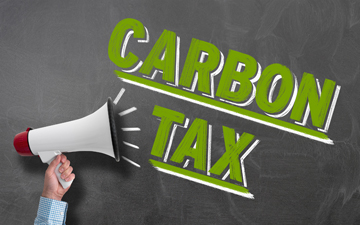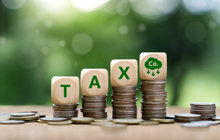The carbon tax needs fixing, not axing — Canada needs a progressive carbon tax

A progressive tax that punished the wealthy for their outsized emissions would be more palatable than a flat steering tax that hurts low-income Canadians
 |
Peter Dietsch is a professor in the department of philosophy at the University of Victoria. |
CARBON TAXES are a key tool in humanity’s efforts to avoid global warming above 2 C. The idea of a carbon tax is simple: it works by making carbon-intensive activities more expensive, thus encouraging individuals to reduce these activities.
Given the existential threat climate change poses to our societies, one would hope that such a key policy tool was both effective and enjoyed broad public support. Neither of these things are true today. Why is that and what needs to change? My research has sought to address these questions.
The carbon tax is a so-called steering tax. Its goal is to change people’s behaviour, not to raise revenue for the government. However, the current version of the carbon tax in place in Canada and many other countries does not change people’s behaviour as effectively as it could and should. To see why, we consider two frequently ignored facts.
First, rich people emit considerably more than the average person. Studies on socioenvironmental inequality estimate that the top 10 per cent of emitters are responsible for about 50 per cent of individual carbon emissions. Think of private jets, which emit up to 4.5 tons of CO2 equivalent (tCO2e) per hour. That is three times as much as the average human on the planet can emit per year if we want to meet our climate targets.
Second, someone in the top 10 per cent of incomes in Canada, that is someone who in 2022 made more than $106,300 after tax, will not even bat an eye at the current carbon price of $80 per tCO2e, let alone change their consumption habits. For context, $80 per tCO2e translates into under 18 cents per litre of gasoline at the pump.
Put simply, by its very nature a flat carbon tax that ignores socioenvironmental inequality and charges everyone the same is both unequal and ineffective climate policy. A progressive carbon tax would change that.
Progressive taxes are more effective
The basic idea of a progressive carbon tax is to have different carbon tax brackets based on individual emissions: everyone would pay a low carbon price for reasonable carbon use; for instance, on your first 1.5 tCO2e of emissions, you would pay $75. Beyond that, the tax rate goes up.
For people whose emissions are above a certain threshold — for example, more than 35 tCO2e or twice the annual emissions of the average Canadian — the price per ton might reach prohibitive levels in the tens of thousands of dollars per ton. The precise thresholds and tax rates are up for discussion, but the general idea is clear enough.
Some countries successfully use this approach in other policy areas. For example, in Finland and Switzerland, traffic fines are based on income. To make rich people reduce their speed, speeding tickets can rise to six- or seven-figure sums. To make them reduce their carbon footprint, a similar logic applies.
You might think a progressive carbon tax would be difficult to implement. After all, do we know how much a person emits? Fortunately, fairly reliable proxies for the two main categories of greenhouse gas emissions, transport and housing, are already available. Public data exists on who owns or uses what aircraft, cars or boats, and we also have a good understanding of the carbon-intensity of building and heating homes.
By elites, for elites
The above considerations also provide important clues for why the current, flat carbon tax lacks broad public support.
Defenders of the tax often scratch their heads about why there is so much frustration with the carbon tax despite the generous rebate structure. In British Columbia, for instance, individuals with an annual income below $41,071 will automatically receive a rebate of $504 per year and most are set to actually come out ahead financially under the current policy.
So why the popular discontent with the tax? Misinformation about rebates as well as an (often poorly justified) general sentiment against any form of taxation certainly plays a role. However, here is another explanation whose importance is underestimated.
When communities have a common goal, it matters for members of the community to feel that everyone is pulling their weight to achieve that goal. Today’s carbon tax fails this test. The burden of adjustment in terms of reducing emissions falls squarely on low-income Canadians, whereas the wealthy just shrug it off and pay the tax. Moreover, the fact that some portion of today’s income and wealth inequalities are perceived as unjust to begin with adds insult to injury.
Against this background, resentment against the current, flat carbon tax is not only surprising, it is also legitimate. The policy is rightly perceived as a policy by elites, for elites. It contributes to the low approval ratings of the Liberal government, as highlighted this week by the resignation of Finance Minister Chrystia Freeland, and may play a role in helping Pierre Poilievre’s Conservatives come into power at the next election.
A progressive carbon tax does not suffer from the same flaws as a flat rate tax. While promoting it will certainly elicit pushback from some, there is an opportunity here for political parties who genuinely have the interests of present and future generations of Canadians at heart to make a real change.
Peter Dietsch is a professor in the department of philosophy at the University of Victoria. Read the original article with full hyperlinks on the Conversation Canada. Title image: iStock ID 1162564499. Author image courtesy The Conversation Canada.











(0) Comments